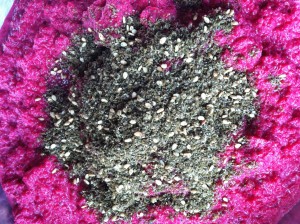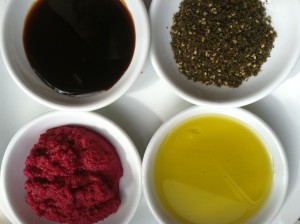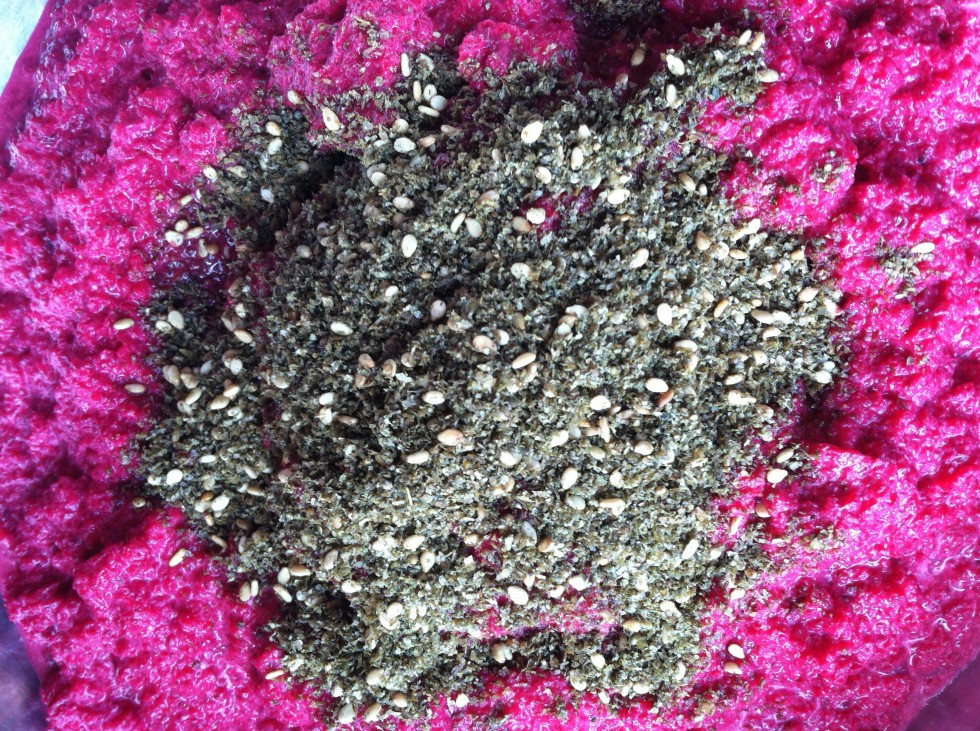
Pureed Beets with Za’atar
Dear Diary,
If the Apocalypse should ever come and we should have to dine solely from the contents of my cupboards without access to Village Market or Whole Foods, here’s what our diet might consist of: Water chestnuts; coconut milk; a package of honey-glazed Buffalo Jerky from a company called Climax Jerky whose slogan is “Reach Your Peak” (it was a gift, but I won’t name names); a box of Pfanni-brand soup dumpling mix whose instructions are entirely in German and whose sell-by date, stamped on the bottom, is April 2009; a package of very expensive Beluga lentils whose cooking instructions are also in German; a tiny jar of creme of porcini mushrooms with white-truffle-something whose label is entirely in Italian; tubes of wasabi paste, anchovy paste, and concentrated Roma tomato paste; sel de provence, fleur de sel de Guérande, smoked sea salt, and Himalayan Pink Salt, which originated from Marine fossils over 200 millions years ago, according to the label; and two apparently unused jars of juniper berries.
All of these obscure, esoteric, and exotic items I have in my cupboards, yet over the weekend when I decided to cook an entire menu out of Yotam Ottolenghi’s amazing cookbook Jerusalem, I was yet again confronted with the aggravating dilemma that plagues anyone who loves to cook out of ethnic cookbooks: The Thing You Don’t Have.
I discovered Jerusalem at a dinner party months ago, when someone served an absolutely show-stopping beet-and-walnut salad. It was so good I was afraid to ask for the recipe. I thought it must be someone’s grandmother’s secret heirloom recipe passed down in the family just to intimidate dinner guests who thought they already knew a thing or two about cooking. The hostess, however, was kind enough to reveal page 73 of Jerusalem as the source. I was in fact able to reproduce it pretty well, though it turned out that the key to that show-stopping depth of flavor was a combination of tamarind water, walnut oil, and pomegranate seeds.
Did I mention that there are also now nearly-full jars of tamarind water and walnut oil in my larder?
When confronted with the presence of The Thing You Don’t Have in a recipe, I always run through a whole decision tree that goes like this: Where is the nearest Hungarian/Mongolian/Kenyan/Filipino grocery store? How large a container of this Elusive Thing am I going to need to buy in order to get the one teaspoon of it this recipe calls for? What are the chances that I will ever again use this Elusive Thing in a recipe before the Apocalypse comes? (Oh, did I mention an enormous jar of spiced preserved lemons that took up residence in the back of the refrigerator five years ago?) Is anyone going to notice if I make the recipe and leave this Elusive Thing out of it? How loudly is Mr. Darcy going to sigh when I come home with another pricey container of something whose label is in a language neither of us can read? How badly do I want to make this recipe, anyway?
The thing about Yotam Ottolenghi, though, is that I really trust him. I have absolute faith that he puts a teaspoon of this and a tablespoon of that into the recipe for a reason, and that like animating a wizard’s potion with a bit of Dragon’s Tooth or an Eye of Newt, these are the ingredients that will actually make the dishes magical. And I really, really, really wanted to make Puréed Beets with Yogurt and Za’atar, from page 53, which requires exactly one tablespoon of said za’atar. (If you don’t know what za’atar is, it’s a spice mix of dried hyssop leaves, ground sumac, toasted sesame seeds, and salt, which Ottolenghi describes as “almost as one with the smell of goats’ dung, smoke from a far-off fire, soil baked in the sun, and–dare we say it–the healthy dose of sweat that is the inevitable result of hiking around Jerusalem.” So, you know, just substituting oregano probably wasn’t going to do the trick.

Clockwise from top left: Date syrup, za’atar, olive oil, sumac
Luckily, my proximity to Chicago puts me within fairly easy reach of every possible kind of ethnic grocery store imaginable. The problem, at the Middle Eastern place I went to, was that za’atar only came in giant sacks–and though I might have been willing to try to sneak that one thing alone past Mr. Darcy, I also needed a tablespoon of sumac–available only in the same size bag–and 1 1/2 tablespoons of date syrup, which comes in a giant $6 jar. Altogether, this would have amounted to $14 of mostly-to-be-wasted ingredients I didn’t think I could justify, even to myself.
I was about to surrender the whole plan and just make stuffed peppers when another woman who was poking around the store who had overheard me discussing my dilemma with the store clerk stepped in. She said her family originally came from Jordan but had lived all over the Middle East, and she was just now beginning to cook for herself and remembered all these ingredients as having been essential to the flavors of the dishes she loved. Would it be possible, she asked the store clerk, for him to open the bags of spices and sell half of each to her, and let me have the other half?
Then she and I just stood in the olive oil aisle chatting away for ten minutes or so while the store clerk opened the bags and poured half of each into a plastic container. When we paid he swore both of us to secrecy. “I’m not supposed to do this kind of thing,” he said. “Don’t come back and tell my manager somebody did this for you or he’ll kill me.”
“As far as I’m concerned, it never happened,” I said, grinning. “But now I’m going to be your customer for life.”
Listen, Diary: the Puréed Beets were everything I hoped for, and more. So were the Turkey & Zucchini Burgers with Green Onion & Cumin, which had required that tablespoon of sumac in the tangy yogurt dressing.
I’m pretty sure I’ll be making both of them again–hopefully again and again–and every time I whittle down my stores of za’atar and sumac by yet another tablespoon, I’ll think about that woman from Jordan who took the other half of my spices, and wonder what she’s cooking up with hers.
